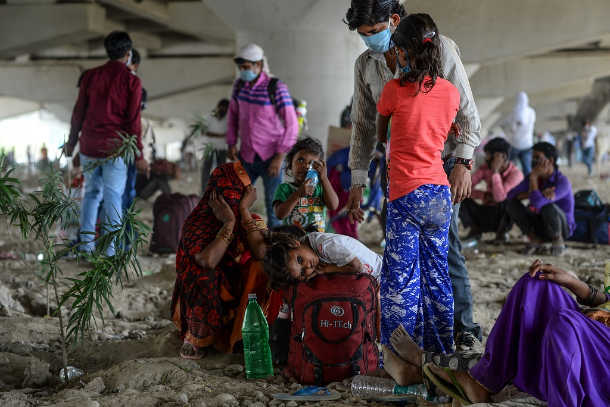
Migrant workers wait for transport in New Delhi on May 17 to return to their hometowns in Uttar Pradesh and Bihar after the government eased a nationwide lockdown as a preventive measure against the coronavirus. (Photo: Sajjad Hussain/AFP)
Mumbai, India's financial hub and home to business tycoons, today reflects an image of gross failure and negligence in dealing with the challenge of the coronavirus pandemic.
The government enforced the fourth phase of the lockdown on May 18 even as Mumbai, known for its cosmopolitanism and resilience, has turned into the country's Covid-19 capital.
On May 17, Mumbai's death rate doubled to 696 from 343 a fortnight ago, while cases have more than doubled to 18,550 from 8,800 in the crowded city of 18 million people.
Health services and cleanliness were never priorities for the civic authorities and the gruesome picture today only exposes the major faultline of the city planners, civic body and the state government.
According to official estimates, Maharashtra accounts for more than one third of Covid-19 cases in India, while state capital Mumbai alone represents more than one fifth.
Shiv Sena, which touts Hindu fundamentalism and the Marathi language, is running a coalition regime along with the Congress party and a regional outfit of the Nationalist Congress Party.
Authorities maintain things are beyond control as there is a shortage of at least 1,000 hospital beds each day. In some hospitals Covid-19 patients were kept near dead bodies, and photos and videos of such scenes have gone viral on social media and television reports.
Morgues are packed, and in some cases there have been cases of bodies going missing.
Social workers who visited state-run hospitals told UCA News that patients are forced to share beds and medical workers often leave ill-fated patients on their own or in the hands of their relatives.
Most health staff in Mumbai and adjoining Thane are overworked.
Mumbai’s civic body often flouted established norms and did not even conduct tests on medical staff and doctors, increasing the possibility of positive cases since March.
Worst of all, the pandemic has hit Dharavi, Asia's largest slum, and at least two well-known hospitals have become hotbeds for transmission of the killer virus.
On May 17, civic authorities said 6,528 high-risk contacts in Dharavi were identified and quarantined.
According to the state's beleaguered Home Minister Anil Deshmukh, there were more than 100,000 cases of violating Covid-19 lockdown restrictions.
Police have registered more than 100,000 offenses and lockdown violations since the lockdown began on March 25, leading to 19,630 arrests and the seizure of 55,784 vehicles.
There were also reports that more than 1,000 police personnel in the state were infected amid allegations that over 90 percent of migrant workers in Mumbai did not receive government rations during lockdown.
"It is a serious failure of the government and civic mechanism," said Mumbai-based social worker Raghu Vaidyanathan.
"In some areas shopkeepers are opening shops. Moreover, even the curfew is violated as Ramadan shoppers pick up stuff only in evening hours. People are thronging these places, flouting all rules," he said.
The state government extended the lockdown until May 31, hours before such a formal announcement was made by the federal government on May 17 evening.
Besides violations of lockdown and social distancing, there are other issues and complaints, said a social worker who requested anonymity.
“In some cases there has been poor sanitation in hospitals. It would not be inaccurate to say those with symptoms and those who tested positive have been herded like cattle," he added.
The federal government extended the nationwide lockdown to May 31 with certain exceptions.
The government has allowed interstate movement of buses and private vehicles with the consent of the involved states in a move that will greatly ease public transport and help migrant laborers.
However, domestic and international flights and metro networks in cities remain closed along with shopping malls, cinemas, schools, colleges, hotels and restaurants. The ban on religious and political gatherings also remains in place.


